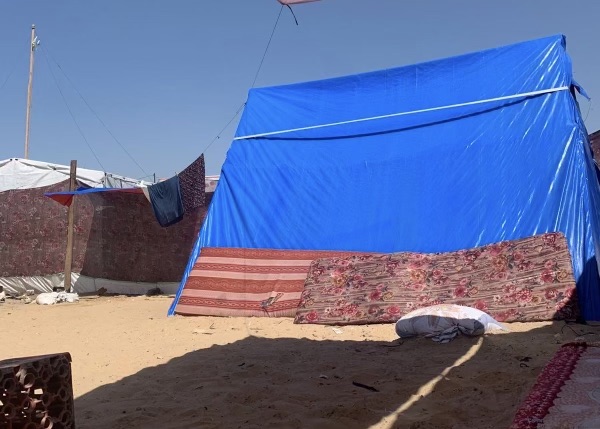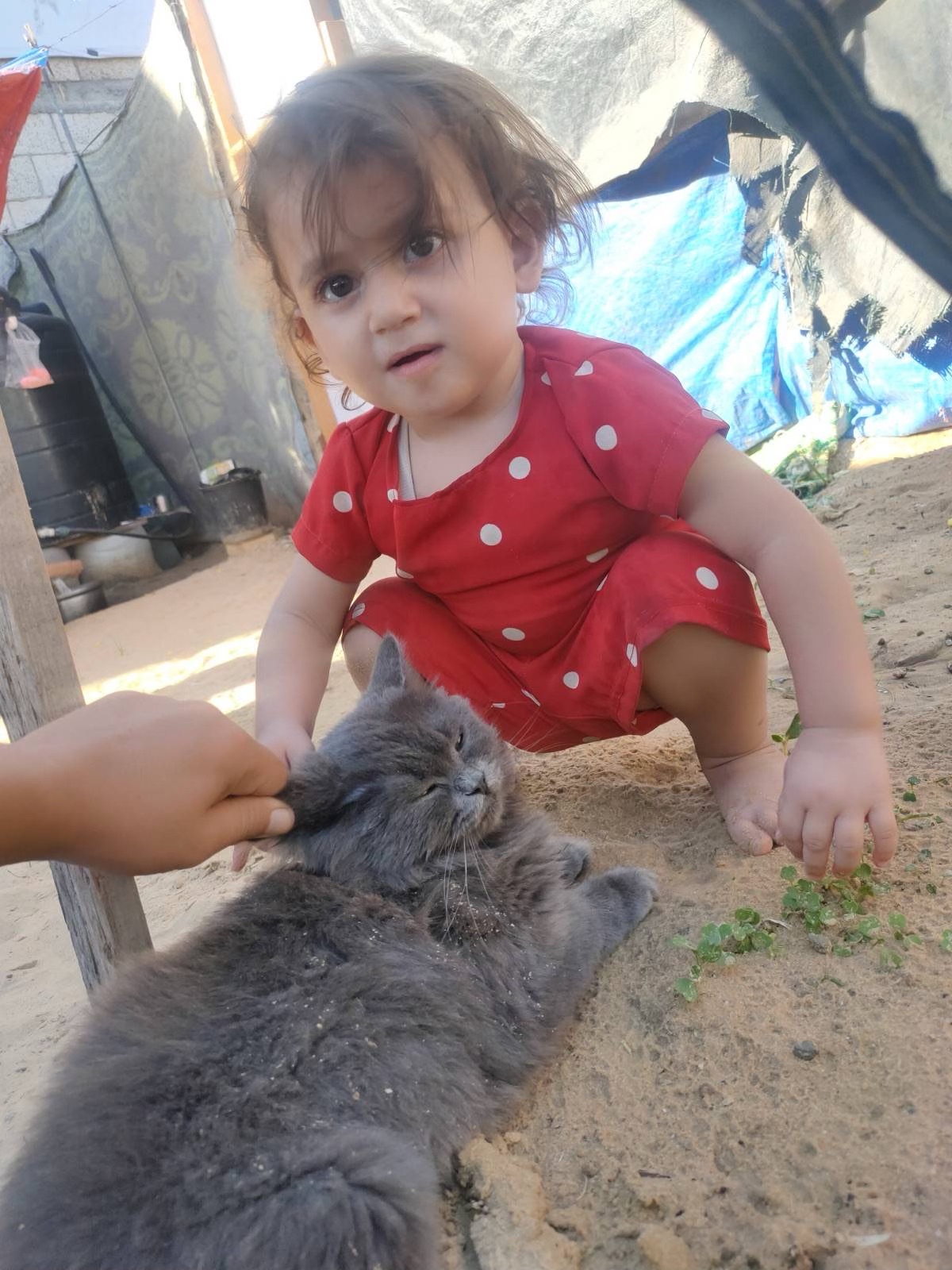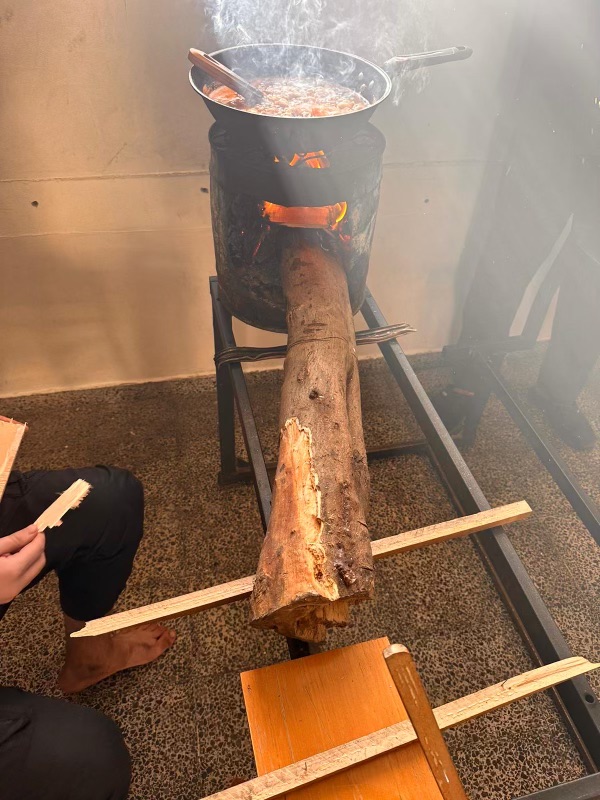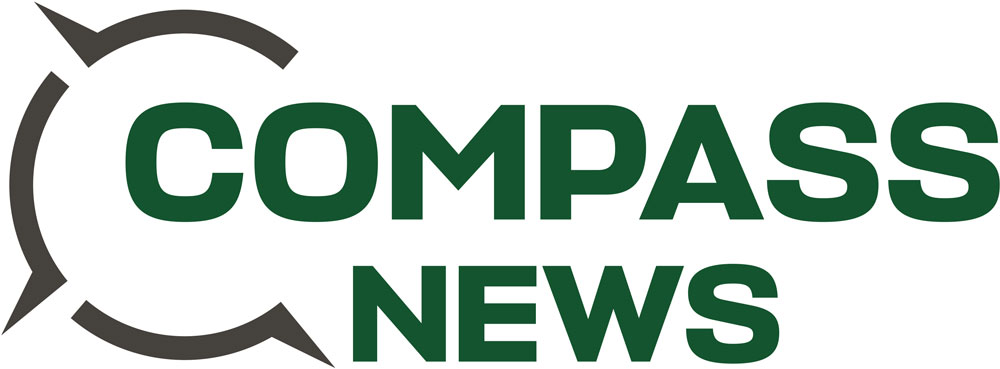Looking back at the last year, Ottawa resident Karima* didn’t expect to be in the position she is now. But what began as “doing her part” to help those in need has led to her being a primary contact and source of financial and emotional support, helping a family in the Gaza Strip stay alive.
In October 2023, after the Hamas attacks, and the escalation in violence between Hamas and Israel that has followed, Karima said she began looking for ways to help the civilians who were caught in the war.
She reached out to a woman in Egypt who had started an initiative to help Gazans connect to the internet and data. The initiative, now called Connecting Humanity, provides internet access to people in Gaza using donated eSIMs. From her home in Ottawa, Karima began to get involved, wanting to help people connect to friends, family and authorities outside of Gaza.
Over time, she started communicating more and more with the people who were using her donated eSIMs. The family she connected with was desperate to leave, especially one family, Ali, who has diabetes.
“Of course, everyone wants to leave. But he was really sick. So I managed to collect enough money, over time, for him to leave and go to Cairo,” she said. “It took a while, collecting money from friends and family who wanted to help.
“People want to donate to organizations, not individuals, because they’re afraid of being scammed,” she continued. “And around that time, his brother messaged me.”
Ali’s brother Bassam has cancer and was looking for help to support himself, his wife and daughter, Hanan, who was a few months old at the time. She was born in July 2023.
“He was saying, ‘I don’t have money to buy milk or formula or anything for her. Can you help?’ So then I started talking to (Bassam) too,” said Karima. “And then I knew that this was a bigger issue.”
Karima started a GoFundMe campaign for people to donate towards the evacuation fund for Ali and the fund for food and supplies for Bassam’s family — this includes the entire extended family of 10 people. After a few months, enough money had been raised to allow Ali to leave Gaza and find an apartment in Cairo.
The remainder of the money was being sent to Bassam for food, water, supplies and medicine, as well as pain medication for his cancer treatment. When Karima first connected with them, they were staying in central Gaza in a school. They then followed an evacuation order to Rafah, where they lived on the street before being able to purchase a tent. Their apartment was destroyed by an Israeli airstrike.

One day, Karima noticed unusual activity on the GoFundMe campaign. Users with strange names were donating, then requesting refunds.
“(Ali and Bassam) were getting excited, thinking so many people were donated, but I started to feel like it was suspicious,” she said. “I didn’t know who they were, but they were requesting the money back, so I was getting claims of fraud.”
An email from the GoFundMe Risk Team told Karima that they have seen fundraisers shared to public groups “fall victim to scams by receiving fraudulent donations.”
As a result, Karima’s account was closed and any donations that were not yet transferred to her bank were returned to the donors. Since then, she has been unable to operate a campaign and her account has been deactivated.
There are similar reports on social media, but they are difficult to track. For example, David Mivasir, a rabbi based in Hamilton, Ont., has posted to X that his GoFundMe account had been deleted.
“[GoFundMe] wiped out all contact with 1,100 donors who have given in good faith knowing that their funds will directly support families in Gaza,” the post said.
GoFundMe did not respond to requests for comment on this article or why Karima’s account was closed.
Instead, Karima, a single parent and PhD candidate at the University of Ottawa, has been trying to continue supporting them since then with the help of her family, friends and community members.
“There was someone sending them a little bit of money, and sometimes my friends, and I was doing what I could on my own,” she said. “So (Bassam) bought food at a wholesale price and then delivered it to people that were in his area.”
Prices of in-demand items are continuing to rise; about a year ago, tents were around $100, but now, Bassam said the price is closer to $1,000.
Karima communicates with Bassam daily through WhatsApp, using translation tools to translate his message from Arabic to English. He tells her that they eat one meal each day, and sends her photos to keep her updated: images of the street, the makeshift stove in their tent, and the blue sky above the tents of their neighbours.
The family of three is from the northern Gaza Strip but has been displaced 14 times in the last 13 months. They usually stay in schools or hospitals, or else on the street. They were sheltering in the Al-Shifa hospital, but it was destroyed in April following a 14-day operation by Israeli forces.

They followed Israeli evacuation orders to Rafah, where they bought the tent and stayed at the refugee camp for displaced civilians. They fled when the camp was struck by Israeli forces in May, bringing their tent to Khan Yunis, a city in the south of the Strip.
When the Israel Defence Forces (IDF) launched an offensive into Khan Yunis, their tent was destroyed by shrapnel. One of Bassam’s other siblings was also injured by shrapnel from the nearby bombing. They were staying in a school, but were told to evacuate this week.
No matter where they go, the family is not confident that they will be safe from bombs and airstrikes. There have been several occasions where they “say their goodbyes” to Karima as tanks and quadcopters enter the area.
“Every time you try to step up and solve one problem, there are other problems that come up. From the GoFundMe money at that time, they were able to buy a tent. So now you focus on food, but then (Bassam’s) health went down drastically and he was looking for pain medication, and it’s expensive. Then the tent gets ruined,” she explained. “You’re always dealing with one issue from another.
“You’re trying to deal with one issue, and then another 10 come at the same time,” Karima continued. “Some friends have told me, ‘You have your own problems, just give up. But when you talk to somebody and you have that personal connection … I can’t abandon them.”
Now, Hanan has the flu, so Bassam has been walking to find medicine to help her fever.
A report published by the United Nations on Monday said that an estimated 44,000 Palestinians and 1,700 Israelis and foreign nationals have been killed since October 2023.
Since the border was closed at the Rafah Crossing in May, fewer than 300 patients were evacuated for medical transfers, the World Health Organization (WHO) reported earlier this month. On Nov. 5, another 100 patients, including children, were medically evacuated. According to the report, more than 12,000 are awaiting medical transfer.
There are organizations accepting donations to send aid to people in Gaza, but since some trucks carrying food and medical supplies are stopped at the border, or raided by gangs, Karima said she likes being able to send help directly to Bassam and Ali.

She’s been careful to ensure she isn’t being scammed, even doing video calls with Bassam and seeing his location and family.
In a message to Ottawa Compass, translated from Arabic, Bassam said he wants people watching the war from afar to “care about the discharge of patients to receive treatment and healthcare.” He’s been trying to qualify for medical evacuation, and cannot afford to pay a private company to evacuate him and his family.
He told Ottawa Compass that he sees up to five people with cancer die each day due to lack of treatment.
“It’s just chaos,” said Karima. “There’s this guilt, that I have a warm home and blankets, a bed, clothes, food and security, and they don’t. Knowing what’s happening at this moment, and what they’re going through, I feel really guilty.
“There are social media influencers who can host campaigns, but I’m not one of them, I didn’t collect a lot of money, so I wasn’t able to get the rest of the family members out,” she continued. “It’s frustrating to hear them called terrorists in the media, but most people don’t know what they’ve lived through.”
She’s also frustrated by friends or family members who choose to “look the other way” because they are too disturbed by what they see. For Karima, she can’t imagine disengaging from this family who she has come to know so well.
Pro-Palestinian protests have been continuing across Canada, with one demonstration in Montreal escalating to involve anti-NATO protestors on Saturday. Police made arrests and reported the use of smoke bombs and metal barriers by demonstrators, as well as vandalism of local businesses.
Protests in Ottawa have also been met with an increased police presence in recent days, and organizers and participants have been arrested on charges of mischief and obstructing police.
Karima said she feels disbelief when she reflects on the last year and how meeting Ali, Bassam and their family has changed her daily life.
“People in Gaza don’t know from one minute to the next if they’ll still be alive. The first thing I do in the morning is check if they messaged me or if something happened,” Karima explained. “It’s been a lot, and it’s just very frustrating that the government and politicians and regular Canadians don’t see the need to stand up and help the Palestinians.
“I’m saying Palestinians, but I know a lot is happening in the (Democratic Republic of Congo) and like Sudan and around the world. I’m not aware of how to help the other issues that are happening in those countries, but I can do this,” she continued. “But it’s just so much loss, and nobody else really sees any urgency to try to make it stop.”
Bassam feels like family to Karima now, she said, after chatting with him constantly for so long. But she said she’s living in “survival mode”, always worried for their safety.
“He went to the hospital to charge his phone this morning and was saying it was so cold. and I just felt so bad because I was there in my nice and warm bed. You know that people are going through this and nobody cares,” she explained. “You feel like it’s you against the world, pretty much, because there’s a group of people that do care, but most governments do not care at all, including our own government.”
*Names of people interviewed have been changed to protect their privacy and identities.

